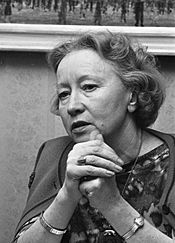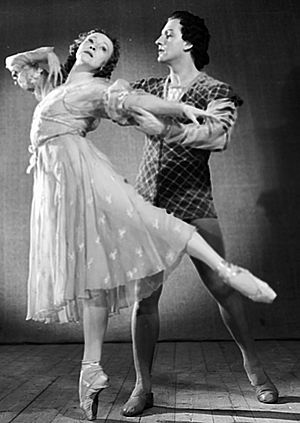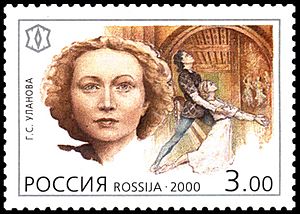Galina Ulanova facts for kids
Quick facts for kids
Galina Ulanova
|
|
|---|---|

Galina Ulanova in 1968
|
|
| Born |
Галина Сергеевна Уланова
8 January 1910 |
| Died | 21 March 1998 (aged 88) |
| Resting place | Novodevichy Cemetery, Moscow |
| Occupation | Prima ballerina assoluta |
| Employer | Mariinsky Theatre, Bolshoi Theatre |
| Known for | Romeo and Juliet, Giselle, Swan Lake |
| Awards | People's Artist of the USSR |
Galina Sergeyevna Ulanova was a legendary Russian ballet dancer. Many people consider her one of the greatest ballerinas of the 20th century. She was known for her amazing acting skills and her beautiful dancing. Ulanova brought a deep emotional feeling to her ballet roles.
Contents
Her Early Life and Training
Galina Ulanova was born in Saint Petersburg, Russia, on January 8, 1910. Both of her parents were solo dancers at the famous Mariinsky Theatre. They even danced with the legendary ballerina Anna Pavlova.
Later, her father became a director, and her mother taught ballet. Galina once said that she felt she "never had a choice" about her career. She felt that ballet was her only path because of her parents' jobs.
As a child, she dreamed of becoming a sailor. She worried that artists worked very hard and got little sleep. Still, her parents sent her to ballet school when she was very young. There, she learned from famous teachers like Agrippina Vaganova and her own mother.
Becoming a Ballet Star
Ulanova joined the Mariinsky Theatre in 1928. People quickly noticed her graceful style and captivating modesty. A famous theater director, Konstantin Stanislavski, was amazed by her acting. He even asked her to perform in his plays.
In 1944, her fame reached Joseph Stalin, who was the leader of the Soviet Union. He arranged for her to move to the Bolshoi Theatre in Moscow. There, she became the prima ballerina assoluta, which means the "absolute first ballerina." She held this top position for 16 years.
The next year, she danced the main role in the first-ever performance of Sergei Prokofiev's ballet Cinderella. She was known for bringing characters to life with her dancing.
Life After the Stage
Ulanova was seen as a great actress as well as a dancer. When she was 46, she was finally allowed to perform outside of Russia. British newspapers were thrilled, saying her performances in London were the biggest triumph for any dancer since Anna Pavlova.
She retired from dancing on stage at the age of 50. After that, she became a coach for many generations of Russian dancers. She helped them learn and improve their skills.
Galina Ulanova passed away in Moscow in 1998, at 88 years old. She is buried in the cemetery of the Novodevichy Convent. Her apartment in Moscow is now a museum to remember her. There are also monuments to her in Saint Petersburg and Stockholm.
What Made Her Special?
Many famous artists and dancers admired Galina Ulanova. They often spoke about her unique talent:
- The composer Sergei Prokofiev called her "the genius of Russian ballet." He said she gave her roles a depth of feeling never seen before.
- The famous British ballerina Margot Fonteyn said Ulanova's dancing was "so marvelous, I am left speechless. It is magic."
- Another great Russian ballerina, Maya Plisetskaya, said Ulanova "created her own style." She believed Ulanova represented a whole era in ballet.
- The dancer Rudolf Nureyev noted her inner strength and modesty. He said she was always focused on her dance, not on theater drama.
These opinions show how much she influenced the world of ballet.
Awards and Recognition
Galina Ulanova received many important awards and honors throughout her life. She was one of the few dancers to be given the title Hero of Socialist Labour, and she received it twice. This was a very high honor in the Soviet Union.
She also received the highest artistic title, People's Artist of the USSR. She won the Stalin Prize four times and the Lenin Prize once. These awards recognized her outstanding achievements in ballet. In 1960, she was also made an honorary member of the American Academy of Arts and Sciences.
Her awards include:
- Twice Hero of Socialist Labor (1974, 1980)
- Four Order of Lenin awards
- People's Artist of the USSR (1951)
- Stalin Prize (four times)
- Lenin Prize (1957)
- Commander of the Order of Arts and Letters (France) (1992)
See also
 In Spanish: Galina Ulánova para niños
In Spanish: Galina Ulánova para niños
- List of dancers
- List of Russian ballet dancers
 | Percy Lavon Julian |
 | Katherine Johnson |
 | George Washington Carver |
 | Annie Easley |



